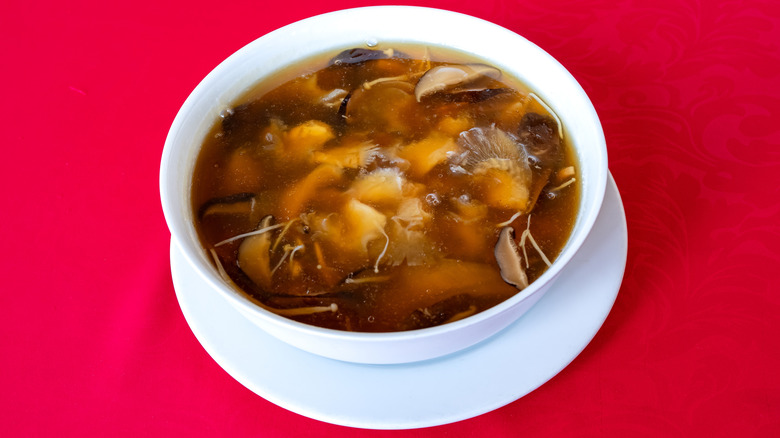
Handout/Getty Images
Ruling over North Korea since 2011, dictator Kim Jong-Un is frequently accused of despotism for the cruel treatment of his citizens, along with numerous other crimes against humanity. Third in a line of Supreme Leaders that included his father and grandfather before him, Kim Jong-Un has experienced a life of privilege and endless opportunities that starkly contrast the brutal existence of North Korean citizens.
This privilege is even evident in the politician's food preferences, as reports indicate that North Korea's leader loves dining on expensive Kobe steaks. Equally problematic is Kim Jong-Un's taste for shark fin soup, though the controversy surrounding this culinary curiosity has more to do with its impact on wildlife and the environment than its high price tag.
While it's considered a delicacy in China and many other parts of Asia, shark fin soup is a rightfully derided dish due to its harmful impact on sharks and the ocean ecosystem. The process of catching and "finning" sharks is incredibly cruel, and this cruelty is why diners are encouraged to avoid ordering shark at restaurants. It's also why the U.S. instituted a law in 2021 that prohibits the sale, distribution, possession, purchase, and transportation of shark fins or any items that contain them in America. A bipartisan group of lawmakers introduced the bill in 2016, among them New Jersey Senator Cory Booker, whose platform website quotes him as stating at the time: "Shark finning is pushing some species of sharks to the brink of extinction ... Sharks play a pivotal role in marine ecosystems, and we must do more to protect them."
Shark fin soup isn't sustainable

yago999/Shutterstock
Kim Jong-Un deservedly receives plenty of criticism, but the dictator is hardly alone in his love of shark fin soup. The consumption of shark fins has been part of China's culinary history for many years and has strong associations with wealth and luxury.
As for the dish's taste, shark fins are said to contribute more mouthfeel than flavor to the soup thanks to their toothsome yet brittle texture. Based on these factors, it's possible that most people who eat the dish do so out of tradition rather than genuine enjoyment. In fact, shark is one of many seafood dishes chefs say they will never order (along with sea urchin and octopus).
The cruelty of fishing practices used to catch and process sharks is unconscionable, but the decrease in shark populations is equally disturbing when you consider the vital roles these creatures play in the ocean ecosystem. As apex predators, sharks help maintain the balance of ocean life as they feed, which benefits other species of fish as well as coral reefs and underwater plants. And because an estimated 73 million sharks die annually as a result of the shark fin industry (via Oceana), urgent action is required to preserve shark populations, for their benefit and ours. It's unlikely that Kim Jong-Un will ever see the error of his ways where this delicacy is concerned, but the rest of the world can still do their part.



